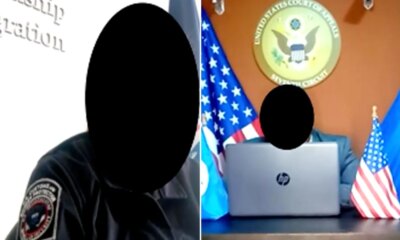New Jersey
Judge to decide Monday whether RFK Jr. can be on New Jersey’s ballot
Attorney Scott Salmon argues New Jersey’s Sore Loser Law bars presidential hopeful Robert F. Kennedy Jr. from appearing on the ballot as a third-party candidate. (Photo by Rebecca Noble/Getty Images)
A judge is expected to decide Monday whether independent presidential candidate Robert F. Kennedy Jr. can be on the November ballot in New Jersey.
Kennedy’s push to get on the ballot has been challenged by attorney Scott Salmon, who said New Jersey’s Sore Loser Law bars candidates like Kennedy from running as an independent in November after trying and failing to secure a major party’s nomination. Kennedy had initially said he would challenge President Joe Biden for the Democratic nomination for president before launching his indepedent bid.
Under questioning by Mercer County Judge Robert Lougy, Salmon conceded that Kennedy didn’t submit paperwork to seek the Democratic Party nomination in New Jersey, but he still took “concrete steps” to win the party’s nod, raising money and holding events to get support from Democrats before launching his third-party bid for the White House.
“There’s a difference between words and deeds,” Salmon told the judge. “And if someone is just saying, ‘I’m going to run for president,’ and then they don’t do anything about it, that there’s a distinct difference between that and someone who is actively raising money and spending money.”
Donald F. Burke, attorney for Kennedy, argued that Salmon’s case should not have been filed in state Superior Court, saying that venue is reserved for Kennedy’s presidential rivals. Voters like Salmon are supposed to take their complaints to the New Jersey secretary of state, he said.
Burke has argued that if Kennedy is dropped from the ballot, the winners would be the Democratic and Republican parties, not voters.
“Major political parties would love Salmon to win because what that would do is make a choice of their candidates and no one else,” he said.
New Jersey Secretary of State Tahesha Way is a defendant in the case. Adam Marshall, attorney for the state, said Friday that if Salmon had filed an objection to Kennedy’s candidacy with the secretary of state instead of with the courts, there likely would already have been a hearing at the Office of Administrative Law and a decision by a judge, and the secretary of state could have responded to those findings, Marshall said.
Salmon maintained he filed in the correct venue because he isn’t challenging Kennedy’s petitions to get on the ballot. He added that taking this matter to the Office of Administrative Law now could delay it further and “limit the rights of myself as well as Mr. Kennedy.”
Way, who is also lieutenant governor, has until Aug. 9 to formally certify which presidential candidates will be on New Jersey’s ballot. Lougy said he understands the urgency of ruling on election matters quickly.
Petitions of electors for president and vice president are due to Way’s office on the 99th day before the general election — that would be Monday, July 29 — and filing objections are due four days after that, on August 2, Marshall noted.
Salmon filed his lawsuit in June. He helped get rapper Ye booted from New Jersey’s ballot in 2020.
While Kennedy’s attorneys fight this case in New Jersey and other states, they scored a win in Nebraska. Kennedy secured enough signatures to appear as a nonpartisan candidate on the ballot in that state despite an objection from its Democratic Party, the state’s secretary of state announced Friday.
GET THE MORNING HEADLINES DELIVERED TO YOUR INBOX

New Jersey
Blizzard causes heavy damage to New Jersey animal refuge

A New Jersey animal shelter is asking for the public’s help after last month’s blizzard did heavy damage to its property in Ocean County.
On social media, Popcorn Park Animal Refuge posted a video and described the fury of the storm. saying that the blizzard “caused unexpected damage… impacting habitats, fencing, structures, and critical infrastructure.”
The nonprofit animal haven says its team “worked tirelessly to keep every animal safe during the storm,” however, “the aftermath has left us facing urgent repairs and significant financial strain.”
Photo: Popcorn Park Animal Refuge
The refuge says this winter has been “especially challenging.” It says “repeated severe weather has forced extended closures to the public, further limiting vital support and creating an added burden during an already difficult recovery period,” adding “we need our community now more than ever.”
Popcorn Park was established in 1977, according to its website. It’s part of the Associated Humane Societies — which bills itself as New Jersey’s largest animal welfare organization. Popcorn Park describes itself as “a sanctuary for abandoned, injured, ill, exploited, abused, or elderly farm animals, birds, and wildlife (domestic and exotic).”
New Jersey
Natural Daylight Time: What is it, and why New Jersey should adapt this practice instead

We’re now officially less than a week before we spring forward in New Jersey, and everyone has an opinion on it. The clock change, by the way, will happen on Sunday, Mar. 8, 2026. We’ll essentially skip the 2 a.m. hour and gain the extra hour of daylight in the evening.
But the reality is, we don’t gain a thing when we do this. We’re so conditioned to believe we gain sunlight, but all we’re doing is shifting the clocks. Animals don’t do this, and are unaffected by what a clock says.
ALSO READ: Snow vs. no snow: How most in NJ feel after latest blizzard
Our pets, on the other hand, are forced to change with our practice of doing this. It really is an outdated practice, but we can’t stop it just like that simply because we’ll either complain about it being too dark during winter mornings under daylight saving, or getting dark too soon during summer nights under standard time.
It should be a lot simpler. And for those of us in New Jersey, it can be. Here’s what I think we should do.
Time clocks calendar thumbs up green check approve sunrise sunset
Leave the clock, adjust our day
When I worked on a golf course, all we did was adjust when we came in based on when the sun came up. During the longer days, we started at 6 a.m. And when the sunrise was later than 6 a.m., we adjusted our start time to 7 a.m.
Why can’t we just do this when it comes to work and school? Leave the clocks in standard time since that’s the one truly aligned with the Earths rotation. During the winter, make the regular workday from 9 a.m. to 5 p.m., then adjust it to 8 a.m. to 4 p.m. in the summer. It’s just that simple.
In other words, we’d be following Natural Daylight Time. Just get rid of the clock change, and adjust our day based on the sunrise. Problem solved.
Final flakes: When does snow season end in NJ?
Gallery Credit: Dan Zarrow
Significant or historical events in New Jersey for March (in chronological order)
Gallery Credit: Dan Alexander
The above post reflects the thoughts and observations of New Jersey 101.5 weekend host & content contributor Mike Brant. Any opinions expressed are his own.
New Jersey
Pennsylvania, New Jersey and Delaware lawmakers react to U.S.-Israel strikes on Iran

The United States and Israel announced a major military assault against Iran Saturday morning, sending shockwaves through the Middle East. The massive aerial attack killed Iranian Supreme Leader Ayatollah Ali Khamenei.
President Trump says “heavy and pinpoint bombing” of Iran will continue for as long as necessary.
The strikes sparked demonstrations in Philadelphia and across the country. Reaction from Pennsylvania, Delaware and New Jersey lawmakers to Operation Epic Fury was swift.
Pennsylvania lawmakers react
CBS News Philadelphia was at an event Saturday night at Villanova University with Pennsylvania Governor Josh Shapiro.
While the governor didn’t have time to take our questions, he said in a statement:
“In going to war with Iran, the President has not adequately explained why this war is urgent now, what this military campaign may look like, or what the strategic objective is.”
Both Pennsylvania senators expressed views of support for the strike.
Republican Dave McCormick released a statement, writing: “They (Iran) are the world’s number one sponsor of terror. The president has given the ayatollahs a chance for a deal, and they have rejected a path to peace and prosperity.”
Democrat John Fetterman posted on social media: “President Trump has been willing to do what’s right and necessary to produce real peace in the region.”
Delaware senator shares concern
Democratic Senator Chris Coons of Delaware is concerned the move by the Trump administration further destabilizes the region.
“I’m hopeful that this phase of war will come to a quick conclusion,” Coons said over a Zoom interview with CBS News Philadelphia. “I’m alarmed President Trump launched a full spectrum war against Iran with our ally Israel without meaningfully consulting the American people.”
New Jersey lawmakers split on strikes
New Jersey Senator Andy Kim, a democrat, called the attack an appalling action by the president.
“He literally called this a war and said American lives could be lost and to be able to do this with justification, no congressional authorization, and most importantly American people don’t want this.”
South Jersey Republican Congressman Jeff Van Drew arguing the attack removed a critical threat to national security:
“What we are witnessing now is a decisive response to years of aggression. The leadership of the world’s largest state sponsor of terror has been dealt a powerful blow. We killed one of the most evil men in the world….”
-

 World5 days ago
World5 days agoExclusive: DeepSeek withholds latest AI model from US chipmakers including Nvidia, sources say
-

 Massachusetts5 days ago
Massachusetts5 days agoMother and daughter injured in Taunton house explosion
-

 Denver, CO5 days ago
Denver, CO5 days ago10 acres charred, 5 injured in Thornton grass fire, evacuation orders lifted
-

 Louisiana1 week ago
Louisiana1 week agoWildfire near Gum Swamp Road in Livingston Parish now under control; more than 200 acres burned
-

 Technology1 week ago
Technology1 week agoYouTube TV billing scam emails are hitting inboxes
-

 Politics1 week ago
Politics1 week agoOpenAI didn’t contact police despite employees flagging mass shooter’s concerning chatbot interactions: REPORT
-

 Technology1 week ago
Technology1 week agoStellantis is in a crisis of its own making
-

 News1 week ago
News1 week agoWorld reacts as US top court limits Trump’s tariff powers























